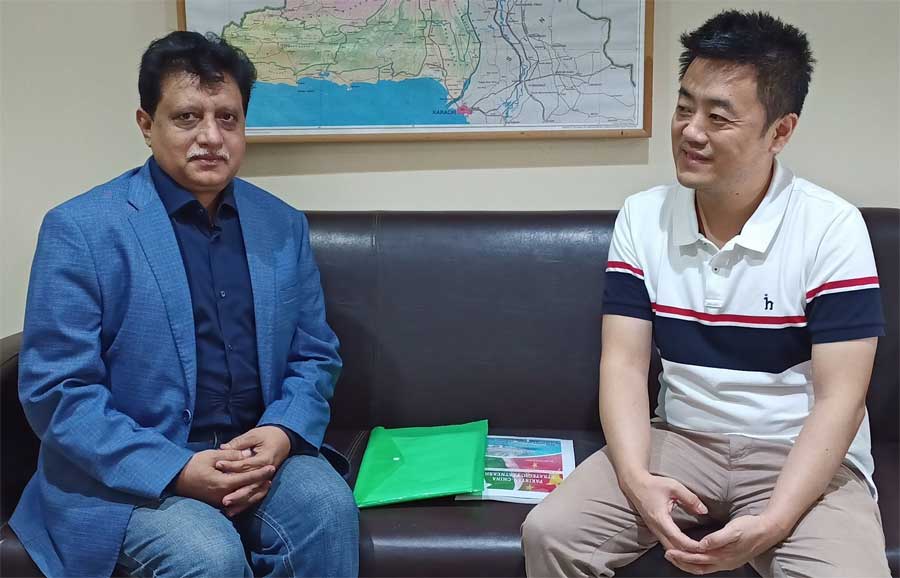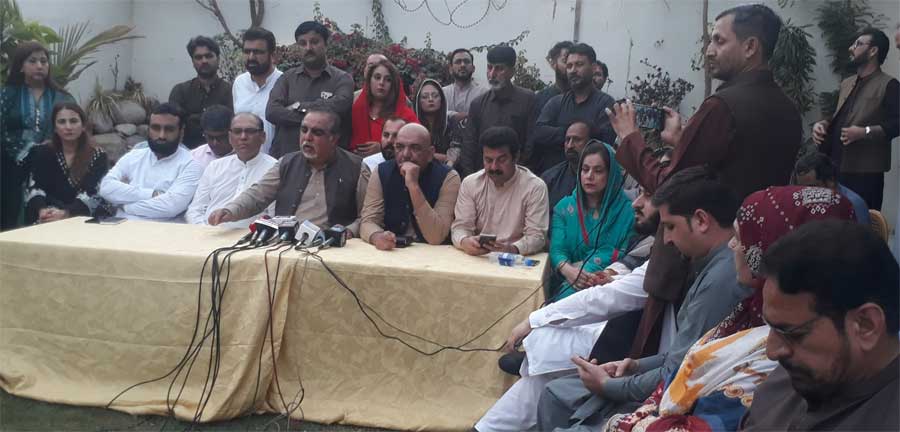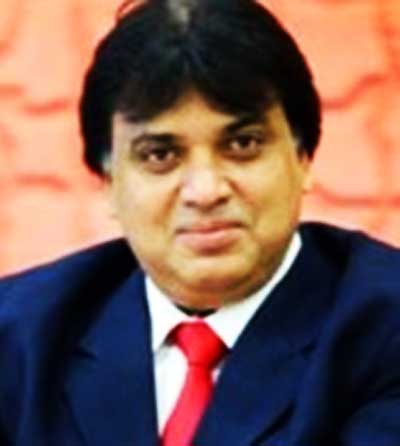When we reached Gwadar at 6 am after a journey of 8 hours, the most beautiful and gorgeous sea in the world was waiting for us.The blue, clear water of the sea was sparkling with golden pearls.As the sun’s rays kissed the sea, the view became more beautiful. Surely, the morning of Gwadar was no less than a beautiful Paradise view. Our very dear friends and hosts Shafi Baloch and Shahzeb Baloch were present on the beach. Shafi Baloch is the Director of Finance at Gwadar University but he has previously served at Gwardar Port while ShahzebBaloch is a businessman who warmly welcomed me.
After breakfast, our first destination was Gwadar Port where we were to interview Prof. Yu Bo Chairman and CEO of China Overseas Ports Holding Company Limited. After identification at the check post, we were entering the building from where the Gwadar Port is operated. For the construction, development and expansion of the port, the experienced and skilled people of China are busy with their work as soon as the sun rises. There is no doubt that the secret of China’s success and development lies in their tireless efforts.
Gwadar has one of the deepest sea-port of the world, and the Government of Pakistan has declared it a duty-free port while a free economic zone has already been established there. This step has not only enhanced its commercial worth but has also accelerated the pace of development to an incredible speed. It is located in a wide-open sea at the entrance of Strait of Hormuz where the mother vessel can directly dock. It can connect with more than half of the world through CPEC via roads, railways, pipelines, and sea-routes. Gwadar provides enormous economic opportunities not only for Pakistan and China but also for other countries of the regions, like Central Asian Republics, Europe, Turkey, Iran, India, the Middle East, Gulf States, and Africa.
Owing to all these aspects Gwadar is going to be the new magnet of the world trade soon. Gwadar is an ideal place to emerge as an attractive tourist destination due to its beautiful virgin beaches, sea life, large open spaces, and its proximity to the Gulf. The beaches in the Gwadar area are the finest in the world, offering sunshine round the year.
The Government of Pakistan handed over the management of Gwadar Port to China Overseas Port Holding Company (COPHC) on February 18, 2013 under an agreement. This agreement was approved by the federal government on January 30, 2013.Gwadar port located on the seafront at the southern tip of CPEC is one of the flagship projects of the mega project. COPHC is spearheading the improvement and expansion of facilities at the port.The first commercial convoy of the CPEC pilot project arrived at Gwadar port for the first time on 13th November 2016. COPHC has been working towards the development of Gwadar Port and Free Economic Zone for the past ten years.When we arrived at the office of China Overseas Port Holding Company, Professor Bao warmly welcomed us.For the Chinese, time is the most precious thing, so after a brief introduction, I started the interview and meanwhile the continued to take sips of tea.
Below is an interview of Prof. Yu Bo Chairman of China Overseas Ports Holding Company Limited, for the readers.
Question: What do you think is the importance of Gwadar Port in the economic development of Pakistan?
Answer: Gwadar port in the Arab sea, located in the mouth ofPersian Gulf, the strait of Hormuz, geographical connection in the Middle East, central Asia and South Asia, economy is the mouth of the economic corridor, the important node of the construction of the 21st century, is Pakistan’s national planning of the third largest coastal port, economic development in western Pakistan has important significance. In 2013, China Overseas Ports Holding Company Ltd Pakistan took over Gwardar Port, under the planning of CPEC, increasing investment, the Gwadar Port from a small wharf, developed into docking cargo, container, LPG large cargo, warehousing logistics, transport services and other multi-functional modern terminal port.
The Gwadar Free Zone is close to the Gwadar Port, covering a total area of 923 hectares. Using location advantage and preferential policies, construction into a port business, logistics, warehousing, transit trade, manufacturing processing, exhibition, conference, environmental protection, agriculture, forestry, fishery, tourism, culture and education, science and technology development as one of the comprehensive modern free trade areas, it will be a strong engine to develop reginal economy.
Question: How profitable will Gwadar Port and Free Economic Zone for investment?
Answer: Gwadar Port and Gwadar Free Zone offer immense potential investment opportunities for investors from Pakistan and beyond. The policy framework and guiding principles administering Gwadar Port and Free Zone are formulated keeping in view its geo-economic significance for transshipment. Since Gwadar Free Zone is exempted from all sorts of provincial and federal taxes and custom duties, the investors are better off when it comes to manufacturing. With no additional costs in the zone, the cost of production becomes much less than that of tariff area. Subsequently, the products will be cheaper and compete in the international market. Thus, providing Pakistan with an indispensable thrust to expand its exports and strengthen its foreign exchange reserves.
Question: How long will Gwadar port be fully operational?
Answer: Gwadar port is already functional. It is equipped with full capacity to handle bulk cargo, containerized and LPG vessels. The three multi-purpose berths continue to process hundreds of metric tons of urea, wheat and DAP fertilizer since the takeover of China Overseas Ports Holding Company in 2013. Last month Gwadar Port hosted around 0.1 million metric tons of urea. Currently, handling of 450,000 tons of wheat is under way, providing jobs and business opportunities to the local community.
Question: What kind of difficulties do you face in making Gwadar Port and Free Economic Zone functional and profitable?
Answer: (1) continue security threats; (2) high costs of electricity generated with diesel; (3) Pakistan national currency policy.
Question: How will industrialists invest in Gwadar without availability of electricity and water?
Answer: The operator of Free Zone, Gwadar Free Zone Company, makes sure that all utility facilities including water and power are provided to its investors. For this purpose, COPHC has established two desalination plants with production capacity of 0.2 million and 0.1 million gallons per day in the Free Zone and Port areas respectively to supply uninterrupted water for consumption.
Similarly, to ensure that all power requirements of the allied industries and port facilities are well fed, COPHC has set
up two powerhouses with a collective generating capacity of 12 Megawatt. The diesel generators produce enough electricity to keep port and free zone operations running 24/7 without any interruption whatsoever. Moreover, more water and power projects are under-constructions to fulfil the demands of the industries in the long run. Chinese funded 1.2 MGD plant is in its final stage of completion.
Question: Gwadar Free Economic Zone will require 240 MW of electricity. How will this need for electricity be met?
Answer: China Overseas Ports Holding Company being the Concession Holder and operator of Gwadar Port and Free Zone is a visionary enterprise. We are hell-bent towards industrializing Gwadar during the concession period. In addition to the coal-powered energy project, COPHC has plans to initiate renewable projects in North Free Zone. Government of Pakistan is also working on alternative electricity sources. 100 MW has already been added to Gwadar’s district grid station, whereas, work on connecting Gwadar from national grid is also underway. Section of transmission line from Besima-Panjgoor is under-construction, which upon completion will provide additional alternative power sources for Gwadar.
Question: The problem of water scarcity in Gwadar is very old, what are your plans to solve this problem?
Answer: Undoubtedly, water scarcity has remained a persistent issue in Gwadar and its outskirts. However, with collective efforts with relevant government agencies, water issue has been overcome to a large extent. With regard to this scarcity, two major issues existed; insufficient water sources and inadequate distribution network. Previously, Ankara dam was the only source. Nevertheless, recently two additional dams, Sawad Dam and Shadi Kaur Dam, have been added and have started providing water to Gwadar city and nearby towns. Apart from the three dams, the Chinese funded 1.2 million Gallons per Day Desalination plant will also start pumping water to the city after completion. Similarly, Gwadar Development Authority (GDA) has almost overhauled the overall distribution network throughout Gwadar. The new pipeline have the full capacity to fulfil the water needs of the city.
Question: When will the desalination plant project be completed?
Answer: At the time of writing, 85% of the construction work of the plant has been completed. It will be completed and start operation by this summer.
Question: How much drinking water will the citizens of Gwadar get every day from this project?
Answer: Even though the water supply is the government task, COPHC has done the best to supply the municipal with water under difficult conditions that the water capacity is not enough to running of the port and freezone. In 2021, Gwadar people were facing COVID-19, hot weather, short of electricity, COPHC supplied a lot of water to the city.
Question: How much will the project cost to complete?
Answer: 50000000USD.
Question: Why the projects started in Gwadar under CPEC could not be completed within their duration?
Answer: As we have seen, since COPHC took over Gwadar Port, many great positive changes happened in Gwardar City, China aided Faqueer School, Technical Vocational School, East Express Way, etc. The New International Airport, the New Hospital are in construction that will be completed this year. But during the constructions, the Chinese contractors and Chinese worker have been facing lot of unimaginable difficulties and challenges, e.g. serious security threats, policy problems, lack of water and electricity, 3 year-COVID-19 affects and so on.
Question: Are investors and industrialists satisfied with security and law and order in Balochistan and especially in Gwadar?
Answer: The government of Pakistan has established a Special Security Division (SSD) within Pakistan Army to provide additional security to projects in Gwadar associated with CPEC. The policies to investment are being improved.
Question: How many companies have started working in the industrial zone so far?
Answer: 35 companies registered in the freezone, 9 of them have run the business or are in construction
Question: In which sector are these companies operating?
Answer: The operating companies are diverse in their operational category, ranging from service industry to fertilizer, metal processing, foods processing and so on.
Question: How many more companies will start operating soon?
Answer: To give an accurate number would be too early at the moment. However, since we have signed sub-lease agreements with a number of companies last year, we hope they will undertake their construction and consequent operations soon.
The first phase of the special economic zone under the China-Pakistan Economic Corridor has been completed in which 43 Chinese companies are going to invest while 200 more firms have been registered for the purpose that besides infrastructure and energy projects, various industries, including textiles, chemicals, automobiles and mobiles, would be set up in the Gwadar industrial zone, which will create more employment opportunities. Despite the coronavirus pandemic, the pace of work has not slowed down and many CPEC projects have been completed ahead of time, after the completion of CPEC, Gwadar will become the largest port in the region and an important economic hub in the world, which would benefit various countries. The Gwadar Port is fully operational and cargo ships have started arriving. CPEC is a great economic project. It is a symbol of the cohesive relationship between Pakistan and China and a testament to our friendship.
After the interview, when I asked for permission, Professor Yu walked me to the door in the traditional manner. Now my next destination was the Pak-China Technical andVocational Institute which has been built with the cooperation of China. I will write in detail about the importance and need of Pak-China Technical and Vocational Institute at Gwadar in another column. Just as China has built a technical Centre, if this project is implemented in its spirit, it can change the destiny of Gwadar for generations to come.




